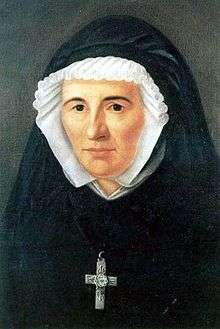Claudine Thévenet
Claudine Thévenet (30 March 1774 – 3 February 1837) in religious Marie of Saint Ignatius - was a French Roman Catholic professed religious and the founder of the Religious of Jesus and Mary.[1] Thévenet witnessed the horrors of the French Revolution - she saw two of her brothers executed - and went on to cater to the needs of dissolute children while using her congregation to provide local girls with a religious education.[2]
Claudine Thévenet | |
|---|---|
 Painting. | |
| Religious | |
| Born | 30 March 1774 Lyon, Rhône, Kingdom of France |
| Died | 3 February 1837 (aged 62) Lyon, Rhône, French Kingdom |
| Venerated in | Roman Catholic Church |
| Beatified | 4 October 1981, Saint Peter's Square, Vatican City by Pope John Paul II |
| Canonized | 21 March 1993, Saint Peter's Basilica, Vatican City by Pope John Paul II |
| Feast | 3 February |
| Attributes | Religious habit |
| Patronage | Religious of Jesus and Mary |
Thévenet was beatified on 4 October 1981 and was later canonized as a saint on 21 March 1993.[3]
Life
Claudine Thévenet was born in the Kingdom of France on 30 March 1774 as the second of seven children.
Thévenet studied at the Saint-Pierre-les-Nonnains convent in her adolescence. The French Revolution saw the destruction of the old government and the formation of a new government that soon led a violent massacre in her hometown in which two of her brothers were killed in public on 5 January 1794 via the guillotine.[1] Her brothers died forgiving their killers and the pair beseeched their distraught sister to do the same - their final words to her were: "Forgive them as we forgive".[3] Not long after this she began to work with working women in her town and soon came into contact with the priest André Coindre with whom she formed a small group that evolved into the Religious of Jesus and Mary on 6 October 1818 dedicated to educating girls; the order was founded on the hill of Croix Rousse.[2] Thévenet assumed a new religious name and began to serve as the order's superior even after the death of Coindre in the 1820s; her order received pontifical approval on 31 December 1847 from Pope Pius IX after her death.
The new Association of the Sacred Heart - formed in 1815 - elected her as its president at some point in which her work included caring for destitute children. On one occasion Coindre found two shivering children and brought them to her.[3] The order later relocated in 1820 to Fourviere and received diocesan approval in Puy in 1823 and in Lyon in 1825.
Her health started to decline in 1835 and she died at the beginning of 1837.[1][2]
Sainthood
The canonization process commenced in France in an informative process that Cardinal Louis-Joseph Maurin inaugurated on 16 October 1926 and later closed on 7 September 1928 while a second process was held during this time. Historians approved the cause on 6 March 1968 while theologians questioned and approved all of her spiritual writings on 8 January 1970 while confirming them to be orthodox in nature and not in contradiction of official doctrine.
The introduction of the cause came on 23 August 1973 and she became titled as a Servant of God. Members of the Congregation for the Causes of Saints and their consultants gathered and approved the cause on 19 July 1977 while the C.C.S. itself approved it on 13 December 1977 leading to papal confirmation of the plenary session sentence on 15 December 1977. She was titled as Venerable on 6 February 1978 after Pope Paul VI approved her life of heroic virtue.
Pope John Paul II beatified the late nun on 4 October 1981. The miracle needed for sainthood was investigated and then validated in Rome on 15 March 1991 which allowed for a medical board to approve it on 30 January 1992 and theologians to do so as well on 22 May 1992; the C.C.S. did so also on 16 June 1992 allowing for the pope to issue his final approval of her miracle and canonization on 11 July 1992. John Paul II canonized her on 21 March 1993.
References
- "Saint Marie of Saint Ignatius" (in Italian). Santi e Beati. Retrieved 10 August 2014.
- "Saint Claudine Thevenet". Saints SQPN. 2 February 2010. Retrieved 25 September 2016.
- "Claudine Thévenet (1774-1837)". Holy See. Retrieved 25 September 2016.
External links
| Wikimedia Commons has media related to Claudine Thévenet. |